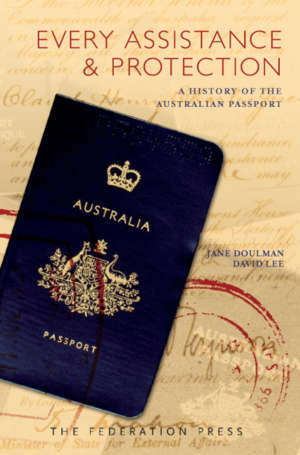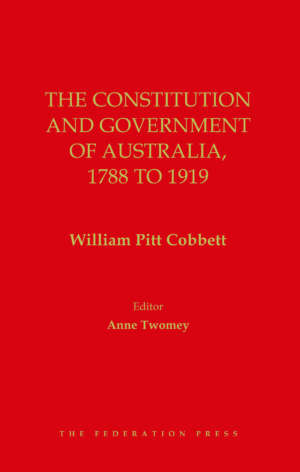Product Description
From time to time, politicians describe Australia as a “good international citizen”. But what does this mean, exactly? What constitutes good international citizenship? And does Australia really qualify as a good international citizen? This book attempts to answer these questions.
Very little has been written about good international citizenship. Most of the limited literature is by international relations scholars and practitioners and therefore naturally tends to focus on Australian foreign policy. Nobody has ventured a definition of the term, or even a list of qualities that a good international citizen should possess. This book therefore begins by proposing such a list, and identifies two particularly important elements: compliance with international law, and support for multilateralism.
Using these elements as a yardstick, Dr Pert then seeks to measure Australia’s good international citizenship throughout its post-Federation history. Account is given of the shenanigans of Billy Hughes at the 1919 peace conference in Versailles (not a great example of good international citizenship); the forgotten contribution to international economic and social cooperation of Stanley Bruce in the late 1930s; “Doc” Evatt’s astonishing performance at San Francisco in 1945, where the United Nations Charter was negotiated, and his personal influence on the form the new world organisation was to take; the almost dormant Menzies years; the Whitlam revolution and re-engagement with the world; and the Fraser reaction. The analysis continues with the Hawke/Keating, Howard, and Rudd/Gillard governments.
One of the main conclusions the book draws from this analysis is that states – whether Australia or others such as the archetypically “good” Scandinavian states – can be paragons of good international citizenship in one area (say, overseas aid) but the opposite in another (such as repulsion of asylum-seekers, or arms exports). Thus, it argues, “good international citizenship” is not a blanket term that can be applied to a state. Instead, a state can be a good international citizen in some areas, and quite the opposite in others. A full account of how Australia rates from this perspective is given from Federation to the demise of the second Rudd government in 2013.
___________________________________________________________________
Good International Citizenship: Values and Interests in Foreign PolicymakingAddress by Professor the Hon Gareth Evans AC QC FASSA FAIIA to Sydney University Law School, 27 August 2015
“[T]hat is about as far as I have taken the concept of good international citizenship in my own speeches and writings over the last three decades. But I am delighted to acknowledge, in her presence here this evening, that we now have a scholar, Sydney University’s Dr Alison Pert, who has taken the idea a good deal further in her book Australia as a Good International Citizen, published last year.
Alison has done not only scholars but policymakers a great service in this book. For a start, she focuses far more concentrated attention than I ever did on defining the core idea of good international citizenship, and teasing out all its possible dimensions: not just support for multilateralism, and willingness to “pitch in” to international tasks, and doing “international good deeds”, on which I have tended to focus, but also compliance with international law, and leadership in improving or raising international standards.
Overall, the practical relevance of Alison Pert’s very scholarly work is that she gives our foreign policy makers, and those elsewhere, in effect a whole new set of talking points to use in persuading possibly reluctant domestic audiences that pursuing “purposes beyond ourselves” is not a fringe activity best left to missionaries and the naïve, but something that every state worth the name should be doing, by which it will be judged by the rest of the world, and by which its citizens will directly benefit if it gets it right.” Read the full Speech…
In the media…
Australians at their best, Governor-General’s Boyer Lectures, ABC RN, Nov 2013 Read transcript or Listen to audio…
Foreword by Gareth Evans AC QC
Acknowledgments
Table of Cases
Table of Statutes
List of Treaties
INTRODUCTION
CHAPTER 1: WHAT IS A “GOOD INTERNATIONAL CITIZEN”?
1. Development of the concept
2. Good international citizenship activities
3. Good international citizenship attributes
(a) Compliance with international law
(b) Support for multilateralism
(c) Willingness to “pitch in” to international tasks
(d) Morality or ethics – “international good deeds”
(e) Leadership; raising international standards
4. Are the attributes cumulative or independent?
5. Does undertaking good international citizenship activities necessarily make a state a good international citizen?
6. The focus of this book
CHAPTER 2: FROM FEDERATION TO VERSAILLES 1901-1919
1. Australia’s international legal status at Federation
2. Domestic politics before the First World War
3. Australian foreign policy 1901-1919
(a) Trade
(b) Defence
(c) Immigration
4. The White Australia policy
(a) Origins
(b) The policy emerges
(c) The White Australia policy of the new Commonwealth
(d) Other countries’ exclusionary immigration policies
5. Australia’s international citizenship prior to the Great War
(a) Engagement with international law
(b) Attitude to multilateralism
6. The First World War
7. Paris 1919
(a) Reparations
(b) New Guinea
(c) The racial equality clause
(i) Hughes’s position
(ii) The Japanese motives for the proposal
(iii) Was Hughes’s opposition justified?
8. The relevance of the White Australia policy to good international citizenship
9. Conclusions
CHAPTER 3: 1919-1941
1. Domestic politics in the inter-war period
2. External affairs in the inter-war period
(a) The Hughes Nationalist governments (1919-1923)
(b) The Bruce-Page governments (1923-1929)
(c) The Scullin government (1929-1931)
(d) The Lyons government (1931-1939)
(i) The Manchurian Crisis 1931-1933
(ii) The Italian invasion of Abyssinia (1934-1936)
(iii) The Spanish Civil War (1936-1939) and the second Sino-Japanese War (1937-1945)
(iv) The proposed Pacific Pact
(v) The approach of war, 1938-1939
(e) The Menzies government (1939-1941)
(i) The end of appeasement
(ii) The League breathes its last
(iii) The early years of the war
3. Engagement with international law
(a) Compliance with international law
(b) Additional qualities
(i) Undertaking further obligations by adhering to other relevant treaties – “treaty participation”
(ii) Exceeding existing obligations
4. Multilateralism
(a) Australia and the League of Nations
(b) The White Australia Policy
5. Conclusions
CHAPTER 4: 1941-1972
1. Domestic politics
2. External affairs
(a) The Labor governments (1941-1949)
(i) H V Evatt
(ii) Evatt and the United Nations
(b) The Coalition governments (1949-1972)
(i) Menzies and the Suez crisis 1956
(ii) The Vietnam War 1965-1973
3. Engagement with international law 1941-1972
(a) Compliance with international law
(b) Additional qualities
(i) The subjects to be considered
(ii) Australia’s treaty participation
(iii) Exceeding existing obligations
A. Human rights
B. Refugees
C. Penal matters
D. The environment
4. Multilateralism
(a) The United Nations
(b) International aid
(c) The Colombo Plan
5. The White Australia policy
(a) Development of the policy
(b) The relevance of the policy to good international citizenship
6. Conclusions
CHAPTER 5: WHITLAM AND FRASER 1972-1983
1. The Whitlam Government (1972-1975)
(a) Engagement with international law
(i) Compliance with international law
(ii) Additional qualities: treaty participation and exceeding existing obligations
A. Human rights
B. ILO and other conventions
C. Indigenous issues
D. Refugees
E. The environment
(b) Multilateralism
(i) The United Nations
(ii) Decolonisation
(iii) Aid
2. The Fraser Government (1975-1983)
(a) Engagement with international law
(i) Compliance with international law
(ii) Additional qualities
A. Treaty participation
B. Exceeding existing obligations
(1) Human rights
(2) Indigenous issues
(3) Refugees
(4) Penal matters
(5) The environment
(b) Multilateralism
(i) The United Nations
(ii) Aid
(iii) Racism, Zimbabwe and southern Africa
3. Conclusions
CHAPTER 6: THE HAWKE AND KEATING GOVERNMENTS 1983-1996
1. Engagement with international law
(a) Compliance with international law
(i) Potential violations of international law – human rights and ILO conventions
(ii) Legislative implementation of human rights treaties
(b) Additional qualities
(i) Treaty participation
(ii) Exceeding existing obligations
A. Human rights
B. Indigenous issues
C. Immigration and refugees
D. The environment
2. Multilateralism
(a) The United Nations
(b) Disarmament
(c) Aid
(d) Peacekeeping and international security
3. Conclusions
CHAPTER 7: THE HOWARD YEARS 1996-2007
1. Domestic policy
2. Foreign policy
3. Engagement with international law
(a) Treaty participation
(b) East Timor
(c) Compliance with international law
(i) Human rights
(ii) Industrial relations laws
(iii) Other indigenous issues
(iv) Immigration and refugees
(v) The Hicks case
(vi) The death penalty
(vii) The environment
(viii) The Iraq war
(ix) Pre-emptive use of force
4. Multilateralism
(a) The United Nations
(b) Peacekeeping and international security
(i) Bougainville
(ii) East Timor
(iii) Solomon Islands
(iv) Afghanistan
(c) Overseas aid
5. Conclusions
CHAPTER 8: THE RUDD AND GILLARD GOVERNMENTS 2007-2013
1. Engagement with international law
(a) Treaty participation
(b) Compliance with international law
(c) Engagement with international law in particular fields
(i) The environment
(ii) Human rights
(iii) Indigenous issues
(iv) The Northern Territory Emergency Response
(v) Mandatory sentencing
(vi) Asylum seekers
(vii) Anti-terrorism laws
(viii) East Timor
2. The Rudd and Gillard governments’ attitude to multilateralism
(a) Climate change
(b) The United Nations
(c) Overseas aid
(d) Peacekeeping
(e) Disarmament and arms control
(f) Regional engagement
(g) The G20
(h) “Good International Citizenship” rhetoric
3. Conclusions
CHAPTER 9: SUMMARY AND CONCLUSIONS
Has Australia earned the title of good international citizen?
Themes and patterns
(i) Overseas aid
(ii) The environment
(iii) Indigenous rights
(iv) Human rights
(v) Asylum seekers and refugees
General themes
(i) The role of individuals
(ii) The importance of context
(iii) Labor v Liberal
Some concluding thoughts
Bibliography
Index





